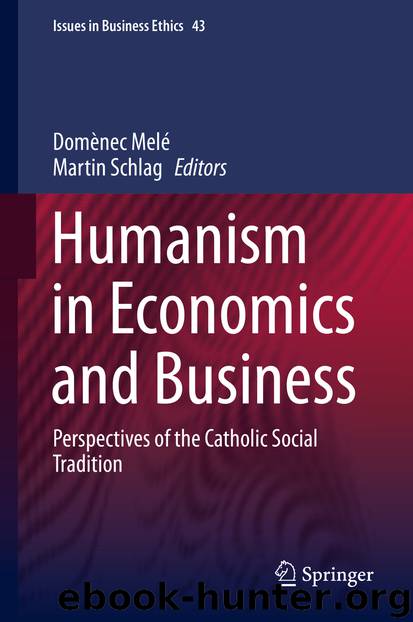Humanism in Economics and Business by Domènec Melé & Martin Schlag

Author:Domènec Melé & Martin Schlag
Language: eng
Format: epub
Publisher: Springer Netherlands, Dordrecht
According to Mattson and Clark “Western philosophers and theologians have arrived at a more-or-less shared understanding of human specialness, imparting dignity” (2011, 306). This seems correct and, to some extent, it may even be accepted beyond Western civilization, as we will see below.
As noted above, Kant has been extremely influential in the modern philosophical foundation of human dignity and in the above-mentioned second formulation of the Categorical Imperative, essential for Kantian ethics. This formulation entails “respect” for persons and the idea that treating human beings as mere instruments with no value beyond this is ethically unacceptable. Respect for persons, without any distinction of who they are is also crucial for Christian Humanism (e.g., CL 37).
John Paul II does not challenge Kant’s argument that the reason for human dignity is that a person is a moral agent, with free will, and consequently, persons are an end in themselves, but extends the case by saying “the person is not at all a ‘thing’ or an ‘object’ to be used, but primarily a responsible ‘subject’, one endowed with conscience and freedom, called to live responsibly in society and history, and oriented towards spiritual and religious values” (CL 5).
The Kantian rational foundation of human dignity is reinforced by other philosophical positions, such as those held by Aristotle and Thomas Aquinas, who considered that the human being has been endowed with a spiritual and immortal soul. This is a position also defended by CST (GS 14, CCC 1703).
CH shares the consideration and respect for human dignity with other religions and international declarations of human rights. With Judaism, in both the Torah and Talmudic tradition, human dignity is central (Sicker 2001).
Regarding Islam, human dignity is not a well-defined concept. Nevertheless, some modern interpretations of Islam find in this faith a foundation for human dignity. Thus, the Universal Islamic Declaration of Human Rights (1981) stated that “Islam gave to mankind an ideal code of human rights fourteen centuries ago. These rights aim at conferring honor and dignity on mankind and eliminating exploitation, oppression and injustice”. Similarly, the Cairo Declaration on Human Rights in Islam, states: “All men are equal in terms of basic human dignity (…) The true religion is the guarantee for enhancing such dignity along the path to human integrity (1990, art. 1).
In Chinese wisdom traditions the concept of human dignity does not exist as an innate feature. For the Confucian ethic, dignity is acquired by having good intentions, acting honorably, being sensitive to changes in human dynamics, calculating self-interest, and reciprocating in the right way at the right time. However, according to Koehn and Leung (2008), despite these differences, analysis of concrete practical cases suggests that it is possible to devise courses of actions that honor both types of dignity: innate and acquired.
Human dignity is also central in international declarations or covenants of human rights, starting with the Universal Declaration of Human Rights (UDHR) (1948). According to Arieli (2002, 1), the human dignity of every human being is “the cornerstone and the foundation on
Download
This site does not store any files on its server. We only index and link to content provided by other sites. Please contact the content providers to delete copyright contents if any and email us, we'll remove relevant links or contents immediately.
| Anthropology | Archaeology |
| Philosophy | Politics & Government |
| Social Sciences | Sociology |
| Women's Studies |
The remains of the day by Kazuo Ishiguro(8977)
Tools of Titans by Timothy Ferriss(8369)
Giovanni's Room by James Baldwin(7330)
The Black Swan by Nassim Nicholas Taleb(7110)
Inner Engineering: A Yogi's Guide to Joy by Sadhguru(6785)
The Way of Zen by Alan W. Watts(6601)
Asking the Right Questions: A Guide to Critical Thinking by M. Neil Browne & Stuart M. Keeley(5761)
The Power of Now: A Guide to Spiritual Enlightenment by Eckhart Tolle(5758)
The Six Wives Of Henry VIII (WOMEN IN HISTORY) by Fraser Antonia(5501)
Astrophysics for People in a Hurry by Neil DeGrasse Tyson(5182)
Housekeeping by Marilynne Robinson(4436)
12 Rules for Life by Jordan B. Peterson(4299)
Double Down (Diary of a Wimpy Kid Book 11) by Jeff Kinney(4261)
Ikigai by Héctor García & Francesc Miralles(4247)
The Ethical Slut by Janet W. Hardy(4242)
Skin in the Game by Nassim Nicholas Taleb(4239)
The Art of Happiness by The Dalai Lama(4125)
Skin in the Game: Hidden Asymmetries in Daily Life by Nassim Nicholas Taleb(3992)
Walking by Henry David Thoreau(3953)
